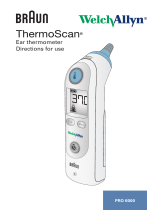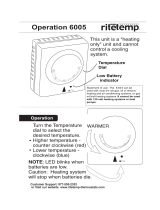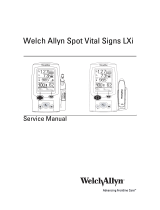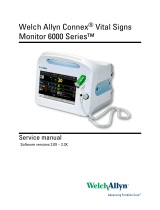Page is loading ...

ThermoScan
Instant Thermometer
IRT 1020
Type 6005
Home Model
English
Use Instructions
Guarantee
Service Centres

Important
safeguards
The Braun ThermoScan Instant Thermometer
is a sophisticated electronic instrument that
has been carefully engineered for both
accuracy and safety. The shape of the
thermometer prevents it from being inserted
far enough into the ear canal to damage the
eardrum. However, basic safety precautions
should always be observed, especially when
using the thermometer on or near children.
Please read all
instructions
carefully before
using this product
To use this instrument safely:
• This product is designed to measure human
body temperature by detecting heat from
the eardrum and surrounding tissue. Do
not use the instrument for any other
purpose. Do not use any other type of
thermometer in the ear.
• Close supervision is necessary when using
this thermometer on, near or by children or
disabled persons.
• Keep lens filters out of reach of children.
To ensure long life and accurate operation of
this precision instrument:
• This thermometer must only be used with
genuine Braun ThermoScan Lens Filters.
(LF 40).
• Do not use this thermometer without a new
lens filter attached. After each use, discard
it and replace with a new one. (See Care
and Cleaning, page 17).
• If the thermometer is ever accidentally used
without a lens filter attached, clean the lens.
(See Care and Cleaning, page 17).
• Never submerge the Braun ThermoScan
Instant Thermometer in water or any other
liquid.
• When not in use, place the storage cover
over the thermometer with a lens filter
attached to protect it from damage and dirt.
• Store unit and lens filters in a dry location
free from dust and contamination where the
temperature remains fairly constant and
within the range of 16°C to 40°C (61°F to
104°F).
• Store lens filters away from direct sunlight
and fluorescent lighting.
• Do not drop, mishandle, or expose to
temperature or humidity extremes
[outside the range of –20°C to 50°C (–4°F
to 122°F), 15-95 % RH non-condensing.]
Do not use if the thermometer malfunctions
or has been damaged in any manner.
• There are no user-serviceable or
replaceable parts exept the 9 volt battery
and lens filters. Refer to page 74 for service
information.
• This product is intended for household
use only. Use of this thermometer is not
intended as a substitute for consultation
with your physician.
For best results, use a 9 volt alkaline battery.
• Do not dispose of empty batteries in
household waste. Take them to special
local collection sites.
2 3

Thank you for
purchasing the
Braun ThermoScan
Instant Thermometer
Unlike other thermometers that must be held
in place for several minutes, the Braun
ThermoScan Instant Thermometer takes a
temperature in just one second. It takes a
“picture“ of the infrared heat given off by the
ear drum and surrounding tissue, calculates,
and displays an ear temperature on the digital
readout.
But way take a temperature at the ear?
Because the eardrum is close to and shares
blood vessels with the hypothalamus, the
temperature control centre of the brain.
Therefore, temperatures taken from the ear
reflect the body’s “core“, or internal
temperature. (Tis is the temperature of the
heart, brain and internal blood supply.) The
ear is also a protected cavity, so, unlike oral
temperatures, the accuracy of ear
temperatures in unaffected by eating,
drinking, smoking and breathing through the
mouth. The ear is a dry cavity so cross-
contamination through mucous membrane
contact, a problem with oral and rectal sites,
cannot occur. Also, the risk of bowel
perforation, a concern when taking rectal
temperatures on infants or children, is
eliminated.
The Braun ThermoScan Instant Thermometer
has been clinically proven to be safe and
accurate. To ensure the best results, please
take the time to read this manual completely
and keep it handy for future reference.
4 5
IRT 1020 product specifications
Product type: 6005
Technical Characteristics:
Patient temperature range 34-42.2°C (93,2-108°F)
Surrounding room temperature
for operational range 116-40°C (61-104°F)
Display resolution 0.1°C or °F
Temperature scales (user selectable) °C or °F
Operating relative humidity (max) 80 %
Long term storage ranges
Temperature –20 to 50°C (–4 to 122°F)
Humidity (max) 95 % noncondensing
Display Mode: Ear ( )
Power source: One 9 volt alkaline battery
(6 LR 61, MN 1604 9 V, alkaline)
Weight (without batteries): 188 g (6.6 oz)
Accuracy characteristics:*
Applicable patient ages All ages
Laboratory error (max)
Patient temperature range Error °C Error °F
37.0°C to 39.0°C (8.0°F to 102.0°F) ±0.1 ±0.2
35.8°C to <37.0°C (96.4°F to <98.0°F) ±0.2 ±0.3
>39.0°C to 41.0°C (>102.0°F to 106.0°F)
<35.8°C or >41.0°C (<96.4°F or >106.0°F) ±0.3 ±0.5
* Meets American Society for Testing and Materials (ASTM) Accuracy
Standards E1112-86 over normal operating range.

Components and
features
Product includes the following components:
• Braun ThermoScan Instant Thermometer
• Lens Filters (20, plus one on thermometer)
• Storage Cover (See Figure 5)
• Use Instructions
• Labels
Not included, but required:
• One 9 volt alkaline battery
(6 LR 61, MN 1604 9V, alkaline).
Preparing the Braun
ThermoScan Instant
Thermometer for use
To remove the thermometer from the storage
cover, slide it forward in the cover (Figure 2a,
arrow 1), then lift up (Figure 2a, arrow 2).
Open the battery door by pressing in at the
arrow and sliding the door down toward the
base of the instrument (Figure 2b)
.
The thermometer is shipped with the Celsius/
Fahrenheit switch set to Celsius. If you wish to
have temperatures displayed in Fahrenheit
(°F), slide the switch as shown (Figure 3a).
The Braun ThermoScan Instant Thermometer
uses a 9 volt battery. To install it, snap the
positive and negative terminals of the battery
onto the appropriate receptacles on the
connector (Figure 3b). Place the battery inside
the compartment and slide the battery door
back into place.
Note: Minimum battery life is one year or
300 temperatures when an alkaline battery
is used.
6 7
Figure 1
Figure 2
Figure 3
1 Activation Button
2 Lens
3 Lens Filter
4 LCD Liquid Crystal Display
5 On-button
6 Battery Door
7 Attach new lens filter

Lens filters are located inside the thermometer
storage cover. Remove the box from the cover
and open the box of lens filters by completely
removing top of box (Figure 4a). You may
return the box to the cover for convenient
storage (Figure 4b).
The thermometer is shipped with a lens filter in
place. To install a new lens filter, remove the
one in place, then take a new one from the box
and holding it by its edges, slide it onto the
lens until it is snug and snaps in place.
Caution: Do not touch the tip of the lens or
lens filter when installing.
With a new lens filter in place, attach the
storage cover to the thermometer to protect
the lens from damage and dirt. Place the lens
end of the thermometer into the storage cover
first matching the indent in front of the
activation button with the corresponding tab
inside the cover (Figure 5a), then snap the
opposite ends together (Figure 5b). To
remove the unit from the storage cover,
reverse this procedure.
Note: Always use and store the thermo-
meter with a new lens filter attached.
Apply label to storage cover as indicated
(Figure 5c).
How ear
temperatures
compare to
temperatures
taken at more
traditional sites
The Braun ThermoScan Instant Thermometer
displays ear temperature readings, which
frequently cannot be compared directly to
temperatures taken at the same time at
another site. This is because the temperature
measured at the ear with the Braun
ThermoScan Thermometer more closely
reflects any rapid changes occurring with the
internal (core) body temperature.
Temperatures taken in the ear canal tend to
reflect changes in internal body temperature
sooner than oral, rectal or axillary (armpit)
because the eardrum shares blood supply
with the temperature control center in the
brain. Oral temperatures are influenced by
eating, drinking, smoking, rapid breathing,
thermometer placement or the inability of the
person to close their mouth completely.
Axillary temperatures have not been found to
be accurate indicators of core temperatures
except in newborns.
Temperature changes are also seen sooner
when measured in the ear canal. Studies
show that rectal temperatures “lag“ behind
internal (core) body temperatures, especially
during periods of rapid warming and cooling,
as when you have a fever. This is due to the
poor blood supply in this area, insulating
effects of stool, and the presence of heat
producing microorganisms located there.
8 9
Figure 4
Figure 5

Body temperature
measurement
Normal body temperature is a “range“, not a
single point, as temperature varies from
person to person. A person’s temperature can
rise with excessive clothing, hot weather or
accelerated activity (such as crying or
exercise). In order to observe these naturally
occurring variations and determine the normal
temperature range for each member of your
family, practice taking temperatures on
yourself and healthy family members at
different times of the day to determine their
“baseline“ temperature. The normal range for
ear temperatures taken with the Braun
ThermoScan Instant Thermometer is from
35.8°C (96.4°F) to 38.0°C (100.4°F) for all
ages.
Normal body temperature also varies with
age. We have the highest temperatures when
we are younger. About our eleventh year,
body temperature begins to decrease
gradually. The elderly population has the
lowest body temperatures. For your reference,
the following chart shows normal ear
temperature ranges by ages groups for the
Braun ThermoScan Instant Thermometer:
When consulting your physician about fever,
remember to communicate that this is an ear
temperature, referrring to the appropriate ear
temperature range in the chart above. Also,
note the individual’s “baseline“ temperature as
an additional reference point.
Normal Ear Temperature Range by Age
Years of Age Celsius Fahrenheit
0-2 36.4°C - 38.0°C 97.5°F - 100.4°F
3 -10 36.1°C - 37.8°C 97.0°F - 100.0°F
11-65 35.9°C - 37.6°C 96.6°F - 99.7°F
>65 35.8°C - 37.5°C 96.4°F - 99.5°F
How to use the
Braun ThermoScan
Instant Thermometer
1. Remove the thermometer from its stora
ge
cover. If stored properly, a new lens filter will
already be in place. (See procedure on
page 7.)
Do not use thermometer without
lens filter attached.
2. De
press the on-button that is located
directly below the LCD (liquid crystal
display) to turn the power on. (See Figure 1)
• All segments on the LCD-display (Figure
6) will be shown for two seconds to
indicate a fully functional display.
• The display will indicate (not ready)
while the unit is completing self test, then,
within two seconds (ready) indicating
that the thermometer is ready to take a
temperature (Figure 7). If no temperature
is taken within two minutes, the ther-
mometer will automatically shut off.
3. Stabilise the head
. In infants, this is best
achieved by laying them flat with the head
rotated so the ear is up.
4. Perform an ear tu
g and position the
thermometer. In order to take an accurate
temperature, the thermometer must be
positioned correctly in the ear. In addition,
an “ear canal straightening“ technique must
be used to straighten the natural bend of the
canal and ensure that the thermometer has
a clear view of the eardrum.
• If you are right handed, hold the
thermometer in the right hand and take
the temperature in the right ear. If you are
left handed, hold it in the left hand and
use the left ear. This will help ensure
proper placement.
• Perform an “ear tu
g“ by using your free
hand to grasp the outer edge of the top
half of the ear and follow the steps in the
chart below. To take your own temper-
ature, an ear tug is best achieved by
wrapping your free hand around the back
of your head and grasping your ear from
behind.
Continue pulling the ear until you are
finished taking the temperature.
10 11
Ready
Not ready
Ear
Change battery
Error
Figure 7
Figure 6

Ear tug and
positioning
technique
Children unter 1 year
• Ear Tug Gently but firmly pull ear straight
back (Figure 8a).
• Positionin
g Approach the ear from behind
the child. Place the lens at the opening of
the ear canal. Using a slight back and forth
rocking motion, gently insert the ther-
mometer, pointing the lens toward the
opposite eye. Gently insert the lens as far
as possible until the ear canal is fully sealed
off (Figure 8c).
Children 1 Year to Adult
• Ear Tu
g Gently but firmly pull ear up and
back (Figure 8b).
• Positionin
g Approach the ear from behind
the person. Place the lens at the opening of
the ear canal. Using a slight back and forth
rocking motion, gently insert the ther-
mometer, pointing the lens slightly in front of
the opposite eye. Insert the thermometer as
far as possible until the ear canal is fully
sealed off (Figure 8c).
5. After the thermometer is correctly
positioned, press the “Activation“ button
with the index finger and hold fully
depressed for one second.
NOTE: In the following situations, it is
recommended that you take three
temperatures in the same ear. If they
differ, use the highest reading.
(1) Infants in the first 90 days of life.
(2) Children under trhee years of age
who have a condition such as a
compromised immune system and for
whom the presence or absence of fever
is critical.
(3) When you are first learning to use the
ear thermometer until you are com-
fortable with the technique and are
obtaining consistent readings.
No more than three readings should be
taken consecutively in the same ear since
repeatedly inserting the thermometer into
the ear canal can lower the reading.
6. When the unit is removed from the ear, the
temperature will be shown on the display
(Figure 9) until another temperature is taken
or the unit powers down. The thermometer
is ready to take a new temperature when
(ready) appears on the screen along with
the last temperature reading (Figure 10). To
help ensure accuracy, you must change the
lens filter after each reading. Inspect the
lens whenever you replace a lens filter. Two
minutes after the final temperature reading,
the thermometer will automatically turn itself
of to conserve battery power.
7. Before storing the thermometer in its
storage cover, change the lens filter (see
page 17 “Care and Cleaning“) and check to
make sure the filter is intact with no visible
scratches or holes. If a lens filter is
damaged, dispose of it and replace it with a
new one. Additional lens filters (LF 40) are
available at most stores carrying Braun
ThermoScan Instant Thermometers, or
contact Braun for a store near you.
12 13
Figure 8
Figure 9
Figure 10

Temperature
taking hints
• It is important to use an ear tug, point the
thermometer lens toward the eardrum and
gently insert far enough into the ear canal to
obtain an accurate reading.
• When taking a temperature on another
person, it may be more difficult to
consistently position the thermometer in
their ear. If the person whose temperature
is to be taken is old enough, ask for
assistance in the positioning process.
• It is not uncommon for a person’s
temperature in the right ear to be slightly
different than in the left ear. When
monitoring temperature during illness, use
the same ear to maintain a constant frame
of reference.
• If a person has been sleeping on one ear for
an extended period of time, the temperature
of that ear may measure higher than
normal. Wait a few minutes before taking a
temperature to allow the ear to stabilise.
• The best temperature measurements are
taken when the ear is free of obstruction. If
you suspect an obstruction or excessive
earwax build up, contact your physician.
• The normal range for ear temperatures
taken with a Braun ThermoScan Instant
Thermometer is 35.8°C to 38°C (96.4°F to
100.4°F).
• To protect the instrument lens, always keep
a lens filter attached. If the thermometer is
accidentally used without a filter, gently
clean the lens and surrounding area (see
instructions on page 17). It is also a good
idea to inspect the lens whenever you
replace a lens filter.
• The thermometer is designed to take
accurate temperatures with a lens filter
in place. Temperatures taken without a
lens filter attached will not be accurate
and can damage the lens. Change the
lens filter after each use.
14 15
Troubleshooting
The Braun ThermoScan Instant Thermometer has been designed to
provide feedback to ensure proper usage and accurate temperature taking.
In many cases this means that instead of displaying a temperature that is
not meaningful, a message will be displayed that will help you take
corrective action. These messages are outlined below:
LCD-Display Situation
Solution
Err 1 Appears after on-button is
pushed if the temperature of
the Braun ThermoScan is
not within its operating
range. 16°C to 40°C (61°F to
104°F).
Move the thermometer to a
room within the 16°C to
40°C (61°F to 104°F)
operating range for 30
minutes and retake
temperature.
Err 2 appears after pushing the
activation button if
temperature measurement
is not within typical human
temperature range of 34°C-
42,2°C (93,2°F to 108°F).
Be sure a lens filter is
attached and the
thermometer is properly
inserted, fully sealing off
the ear canal. Take the
temperature again.
Err 3 Appears after the activation
button is pushed if it is not
held down for a full second.
Take the temperature
again by slowly depressing
the activation button and
holding it down for one full
second.
Err 4 Appears after activation
button is pushed if the
internal temperature of the
thermometer is changing to
rapidly.
Allow the thermometer to
remain for 30 minutes in
the room where the tem-
perature is being taken.
Err 000 The Braun ThermoScan
performs a self diagnostic
test on is circuitry after each
initial activation and when a
new battery is intalled. If any
faults are detected, „Err 000“
will be displayed.
Wait 2 minutes until the
thermometer switches
itself off automatically
(blanc LCD-display). Push
on-button and take
temperature again. If „Err
000“ is repeated, contact
Braun.

Care and cleaning
Lens Tip
• The lens tip is the most delicate part of the
thermometer. It is covered with a soft, thin
membrane which forms a surface that is
transparent to heat waves. To ensure
accuracy, it is very important to keep the
lens clean and intact, and to always keep a
clean, new lens filter attached. Fingerprints,
ear wax, dust and other soiling compounds
reduce ransparency of the lens, resulting in
lower temperature readings. Remember:
always store the thermometer in its cover
when not in use.
• Inspect the lens whenever you replace a
lens filter. To clean the lens, very gently
wipe the surface with a cotton swab or soft
cloth moistened with alcohol or mild soap
and warm water (Figure 11). After cleaning,
allow at least 45 minutes drying time before
reattaching a lens filter and taking tem-
peratures. If the lens is damaged, contact
Braun.
Lens Filters
• Replace lens filter after each use. Make
sure that the new lens filter is not damaged.
• Keep lens filters out of direct sunlight and
ultraviolet light for extended periods of time.
Store lens filters away from dust and
contamination.
Thermometer
• Use a soft, dry, clean cloth to clean the
instrument display and exterior. Do not use
abrasive cleaners of submerge in water or
other liquids.
• This instrument contains precision
components and should not be subjected to
extremes in temperature, humidity, direct
sunlight, shock or dust.
• Store unit in a location where the
temperature remains fairly constant and
within the range of 16°C to 40°C (61°F to
104°F). To ensure that the Braun
ThermoScan Thermometer is always ready
to take a temperature (and avoid Err 4),
store it in the room where it is most
frequently used.
16 17
•
If temperatures appear to be reading low,
ensure proper technique is
being used (see page 11 to 12). Make sure the lens is clean and a new
lens filter is attached.
•
If temperatures appear to be reading high,
be sure a new lens filter is
attached. Inspect the lens; if it is damaged, the thermometer must be
serviced.
•
To assure accuracy and sanitary practice,
Braun recommends
replacing the lens filter after each use. Should you run out of lens filters
and need to take a temperature, you may use the following lens filter
cleaning procedure: Clean the lens filter without removing it from the
thermometer with a soft cloth or cotton swab moistened with alcohol or
mild soap and water. Do not use hot or boiling water. Dry completely with
a soft cloth before reusing. Replace lens filter as soon as possible with
a new one (LF 40).
LCD-Display Situation
Solution
The activation button was
pushed sooner than 8
seconds after the previous
activation. The countdown in
seconds will also appear
until another temperature
can be taken.
Wait until the display
shows (ready) before
taking another
temperature.
Flashing
The battery power is getting
low. There is enough
remaining power for about
10 days or 10 temperatures.
Install a fresh battery.
Constant
The battery is so low that no
more temperatures can be
taken.
Install a fresh battery.
Blank Display 1. The Braun ThermoScan
has switched itself off
automatically.
2. The battery is dead,
improperly connected,
or missing
Depress on-button .
Remove an reinstall
battery. If the LCD-display
remains blank, replace it
with a fresh battery. If
display is still blank,
contact Braun.
Figure 11

Calibration
The thermometer is initially calibrated at the
time of manufacture. If this thermometer is
used in accordance with the Use Instructions,
periodic recalibration os not required. If at any
time you question the accuracy of
measurement, please contact Braun.
Lot number
identification
The date of manufacture can b determined by
referring to the instrument LOT number. This
number can be found by opening the battery
compartment and removing the battery. The
number is preceded by the word “LOT“ and is
in the following format: XXOOOXX or
XOOOXXX, where X designates alpha
characters and O designates numbers. The
first of the three numbers is the last digit of the
year of manufacture. The next two numbers
designate the week of the calendar year that it
was manufactured.
For example: LOT X542XXX. this
thermometer was manufactured during the
42nd week of 1995.
Guarantee
This product is guaranteed for 1 year from
date of purchase against material and/or
workmanship defects. These will be
eliminated either by repairing or exchanging
the appliance as we may choose. All other
claims, including for damages, are excluded.
Service under the guarantee does not affect
its expiry date.
Claims only valid in countries where product
is offcially sold and if accompanied by a
stamped and dated guarantee card.
Claims arising out of the sales contract with
the vendor are not affected by this guarantee.
For UK only:
This guarantee in no way affects your rights
under statutory law.
18 19
/







